8. THX 1138 (1971)
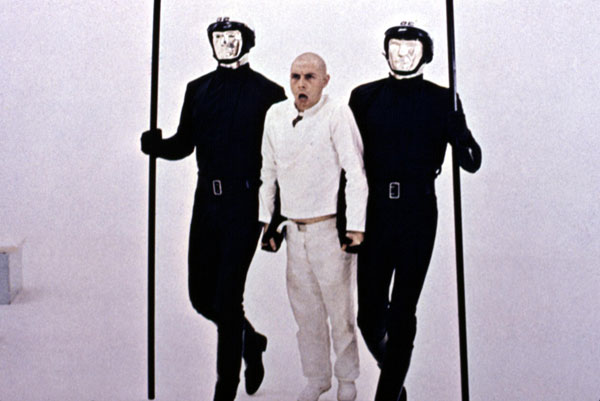
The oldest film on this list, George Lucas’ directorial debut presents possibility the bleakest future of any film on this entire list. Taking place in a 25th century dystopian future unlike any other, THX tells the story of a prisoned society where people are controlled by taking government enforced sedation. They refrain from sexual intimacy, outward emotions, and really any form of enjoyment in life, living out their days mindlessly working and accepting the life they’ve been handed; that is, until one man (Robert Duvall) decides to stop taking his medication.
A hypnotic experience with astounding visuals for the time it was released, THX is a sci-fi classic and a required watch for fans of Black Mirror’s Fifteen Million Merits. Based on a short that Lucas created while studying at USC, the film has the feeling of a massive setting and expansive universe while focusing on the daily life of a single inhabitant within the system.
Personal yet distant, emotional yet impossibly cold, THX 1138 is a ground-breaking achievement and far more thought provoking than 2015’s Equals, which could have just as well made it onto this list for its similarities to Fifteen Million Merits.
7. In Time (2011)
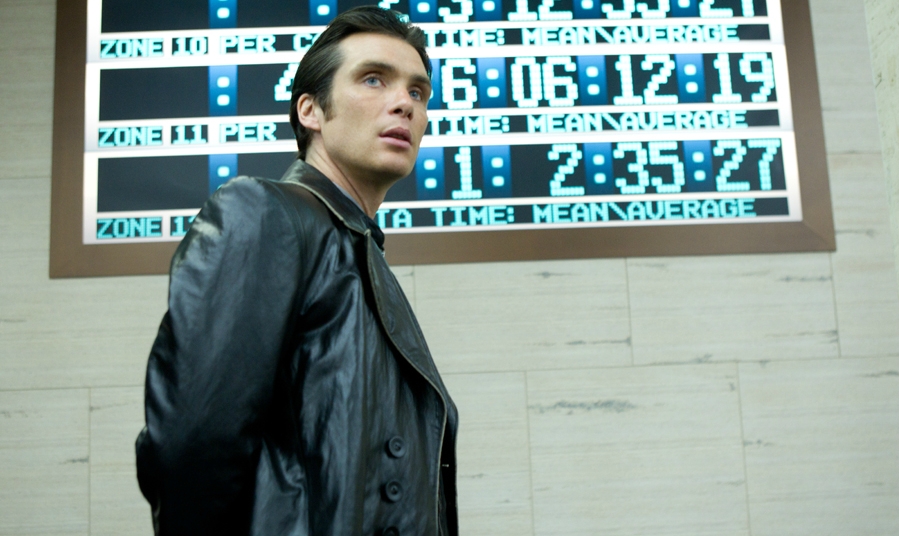
While certainly not the greatest finished product, In Time has all the pieces that if prepared with more care could easily feature in an episode of Black Mirror.
The story takes place in 2169 where everyone stops aging at 25 and has a digital clock implanted in their forearm. As soon you hit 25, your clock begins counting down from one year. What makes this premise so fascinating however is that time has become the universal currency. Instead of earning dollars and cents, you literally earn time, which is added to your clock. In this world, the poor wake up with less time on their clock than hours in the day, while the rich live forever.
A fantastic premise from the writer of The Truman Show and Gattaca, starring Justin Timberlake and Amanda Seyfried as the leads, In Time had great potential but sadly never panned out critically.
The concept of having a piece of technology implanted into your person has been touched upon numerous times in the Black Mirror series: with the grain in The Entire History of You, the cookie in White Christmas, the MASS implant from Men Against Fire, and even the neural implants in Playtest and San Junipero. Clearly the idea of man introducing machine into the body is a common one within the Black Mirror universe, which is all the more reason to include In Time on the list.
6. Children of Men (2006)
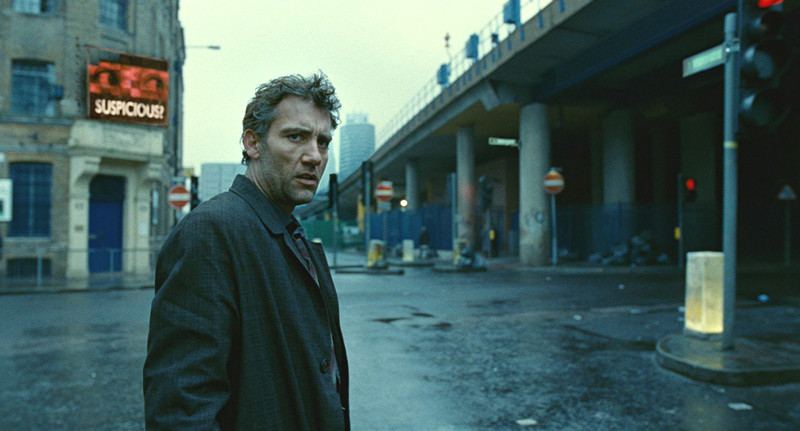
Maybe it’s that the film is set in futuristic UK, maybe it’s the contemporary nature of the film which deals with immigration, but there’s something about Alfonso Cuarón’s Children of Men that has that Black Mirror sterile feel to it.
An absolutely stunning film from beginning to end, photographed by the one and only Emmanuel Lubezki, this science fiction drama depicts a dystopian future that faces global human infertility, leaving civilization on the brink of extinction.
At its core, the film operates as a cautionary tale for society, much like each of Brooker’s episodes, and while it draws no distinct comparison in that universe, it has the look and feel of something born within its confines.
5. Gamer (2009)
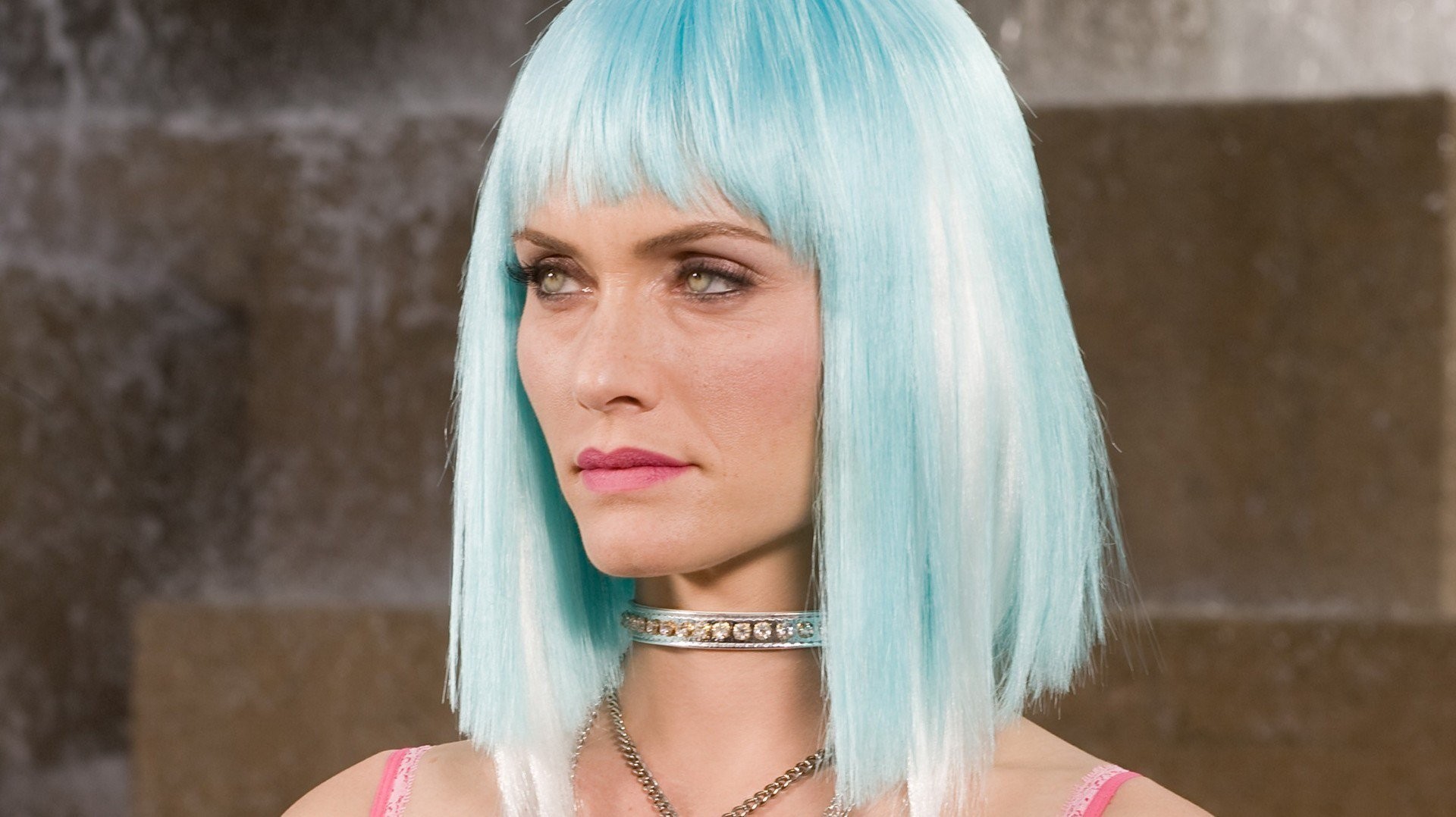
Gamer stars Gerard Butler, Michael C. Hall, and Logan Lerman in a story about what happens when reality and video games come together in spectacular fashion. In 2034, a tech company creates a mind control technology that allows you to control the actions of other human beings, leading to the inception of a popular first person shooter online multiplayer called Slayers. In this game, individuals take control of actual death-row prisoners who use real weapons in enclosed arenas. If a prisoner, fully controlled by an outside user, survives 30 matches, he will earn his freedom.
Gamer is similar to In Time, where the film may not be the greatest finished product but the premise is more than worthy of a spot on the list. Gamer comes in a bit higher up for its similarities to a number of Black Mirror Episodes.
The idea of virtual reality gaming was explored extensively in Playtest, while the idea of altered warfare is the central theme of Men Against Fire. Both excellent episodes, each takes inspiration from the twisted and wickedly bleak Gamer.
4. Westworld (1973)
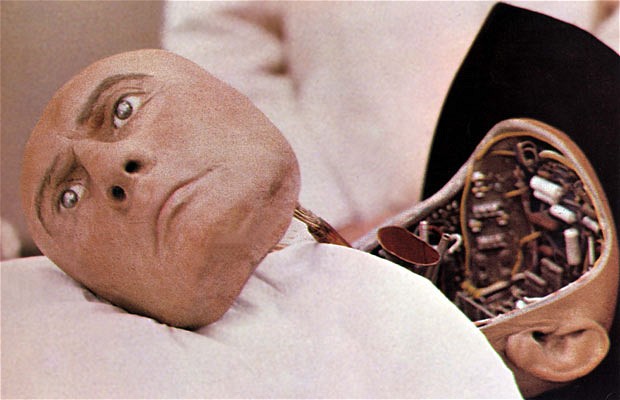
Many are familiar with HBO’s new hit series, Westworld, yet few are aware of its predecessor, written and directed by Michael Crichton himself.
Westworld is a futuristic Disney World set in the old west where the wealthy come to play. For a small fortune, you can travel to a remote island where you can indulge in your greatest adventure fantasies. In this story, two businessmen played by Richard Benjamin and the brilliant James Brolin, travel to Westworld and interact with the many robot desperados and prostitutes which inhabit the site until something inevitably goes terribly wrong.
What’s so great about this original is the expansiveness of the world Crichton has created. Unlike the TV series, the film gives us a glimpse into not only Westworld, but Romanworld and Medievalworld as well. There was even a sequel called Futureworld, where guests take a trip to the would be future. Westworld is an entirely underrated and surprisingly little known sci-fi classic which plays on so many of the themes presented in Black Mirror, from artificial intelligence to class hierarchy.
As an interesting note, Arnold Schwarzenegger said in an interview that he was greatly influenced by Westworld’s android villain, played masterfully by Yul Brynner, that he even modeled his Terminator character off of him.
3. Nerve (2016)
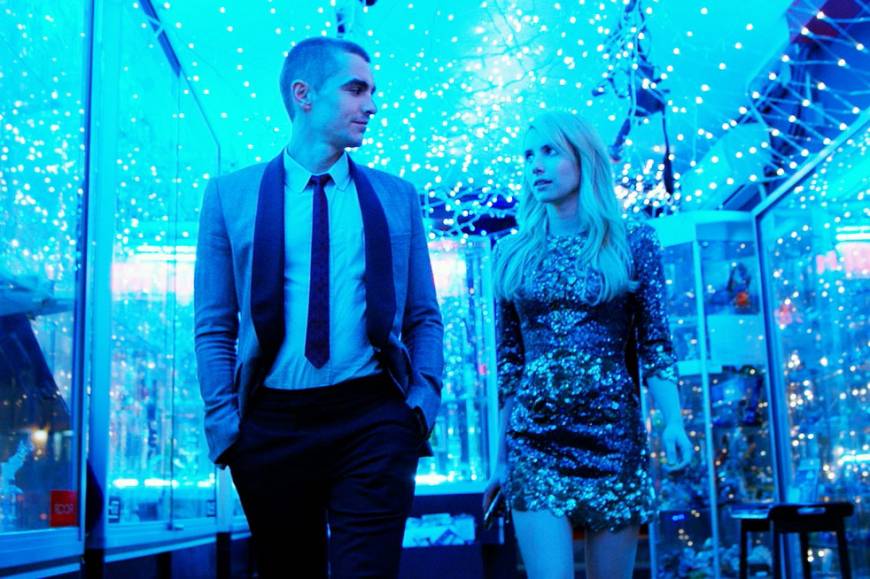
Think of Nerve as a friendlier iteration of Shut up and Dance. From the director of the popular Catfish documentary/series and the upcoming Mega Man live action film, Nerve tells the story of the popularity of an online game called Nerve that allows players to receive compensation for completing dares or merely watch on as others attempt to do so.
A similar plot to that of 13 Sins, Nerve warns of the dangers of social media and the mob mentality which can arise from its existence. In the film, participants hide behind screen names, too afraid to come out from behind their online persona, choosing instead to participate from the outside. Absolutely a contemporary issue, Nerve would easily fit in alongside other Black Mirror episodes.
While the dangers of social media have been broached numerous times throughout Black Mirror’s run, most prominently in Nosedive and Hated in the Nation, Nerve has more in common with Shut up and Dance, which features a young boy blackmailed into obeying every command of a man on the other end of a cell phone.
Whatever he says to do, the boy does for fear of being exposed. Nerve feels eerily similar in that the main characters, played by Emma Roberts and Dave Franco, are forced to do whatever they are dared or face expulsion from the competition. Of all the films on this list, the world presented in Nerve feels particularly attainable in terms of what is in store for us over the next 20 or so years.
2. Ex Machina (2015)

If Alex Garland isn’t quite a household name yet, he soon will be. After writing The Beach, 28 Days Later, Sunshine, Never Let Me Go, and Dredd, Garland made his directorial debut in 2015 with the sci-fi hit, Ex Machina.
Stylish and cerebral, Ex Machina tells the story of a google-like programmer (Domhnall Gleeson) who wins an invitation to spend a week at the private estate of the company’s brilliant founder (Oscar Isaac). Upon arriving at the estate, the programmer soon learns that he is there to test the capability of an AI named Ava (Alicia Vikander) that Isaac’s character has created. What follows is a series of psychological endurance tests for all of those involved, including the audience.
While the performances, specifically Alicia Vikander’s, are all top notch, it’s the concept and execution that stand out here. The claustrophobic nature of the estate plopped in the middle of the vast expanse of nature only adds to the films appeal.
As for Black Mirror, the film bears many similarities to Be Right Back, and not just because Domhnall Gleeson features in both. Each explores what it truly means to be human and the reminder that technology can only fill the longing in our hearts for so long until we come to realize what it really is; a bunch of metal and wires.
After winning the 2015 Academy Award for Best Visual Effects over Star Wars: The Force Awakens, Garland’s follow-up feature is Annihilation, another science fiction thriller starring Oscar Isaac, but this time with Natalie Portman in the leading role. It’s scheduled to release in February of 2018.
1. Her (2013)
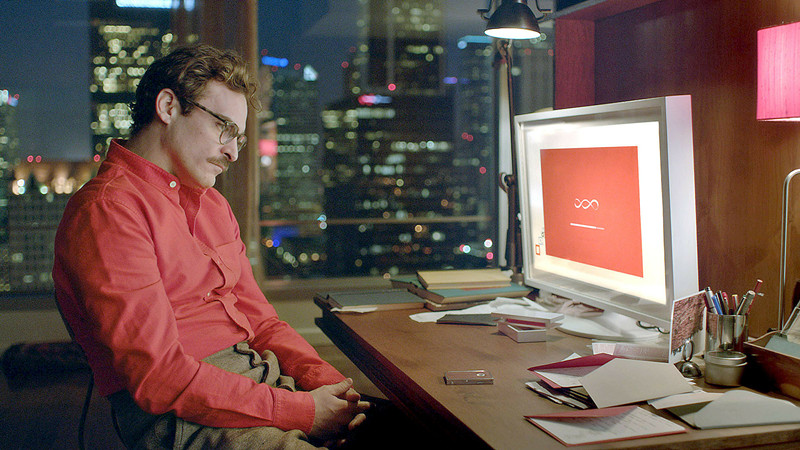
If there was ever a film to fit seamlessly into Charlie Brooker’s Black Mirror universe, this would be it. At the end of the day, Black Mirror is not just a show about the what ifs of the future. It’s a show fundamentally rooted in telling stories about the human condition, merely using the future and technology as a means to tell those stories. With Her, you’re watching a director in complete control of his craft, used this time to examine human relationships.
Her is written and directed by the quirky Spike Jonze and stars Joaquin Phoenix as a simple man who falls in love with a highly intelligent operating system in the vain of the iPhone’s Siri. In this case, the system is named Samantha and is voiced brilliantly by Scarlett Johansson.
Love is a theme rarely approached in Black Mirror, but when it is, it’s done so in spectacular fashion. The Entire History of You, Be Right Back, and San Junipero are arguably the three most popular episodes from the show, all of which deal with love as the central theme.
Her is an incredibly emotional experience that can easily bring you to tears with the thought of where we are now and where we might be headed: a clear-cut top spot on this list.
Author Bio: Alexander Bendo is an aspiring filmmaker based in New York City. A horror and science fiction enthusiast, he is currently editing an independent sci-fi feature which will grace theaters in the coming months. His short-term goal is to attend one of the nation’s leading film programs to pursue an MFA in hope of one day becoming a producer.